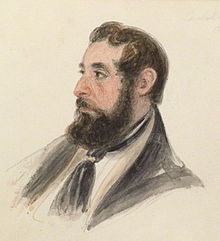Arthur Connolly
Arthur Connolly (born July 2, 1807 in London , † beheaded June 17, 1842 in Bukhara ) was a British traveler, military and diplomat.
Life
Connolly was born on July 2, 1807, the third of six sons of Valentine Connolly, who had come to wealth in India . He was orphaned at the age of twelve when his parents died a few days apart. In January 1823 he became cornet of the 6th Bengal Native Light Cavalry . On May 13, 1825 he was promoted to lieutenant , on July 30, 1838 to captain .
After recovering from illness in England, he was given permission to return to India by land. On August 10, 1829, he traveled to Astrabad via Hamburg , Saint Petersburg , Tbilisi and Tehran . Here he disguised himself as a typical trader and left the city on April 26, 1830 for Xiva .
He was captured and robbed along the way, but escaped sale into slavery and was released. He returned to Astrabad and now traveled via Mashhad , Herat and Kandahar to India, which he reached on January 14, 1831. In 1834 he became assistant to the government agent in Rajputana .
In 1838 he returned to London on home leave.
With Russian and Persian citizens being sold into slavery in the Central Asian states of Khiva , Khokand and Bukhara at the time, Russia decided to send punitive expeditions to the region and was about to expand its influence into Central Asia. This in turn caused unrest in London over the security of India, ruled by the British East India Company. Connolly now proposed to eliminate this situation through negotiations with the rulers there and to organize an alliance of these states against the Russian advance in Central Asia.
Connolly left London on February 11, 1839 with letters of recommendation from Lord Auckland . After a stay in India he reached Kabul in the spring of 1840 , where he was employed in the staff of the British envoy William Hay Macnaghten and took part in the conquest of Afghanistan in the First Anglo-Afghan War .
He left Afghanistan at the end of September and traveled to Khiva and Kokand via Merw . He reached Bukhara in October 1841 and wanted to work there for the release of Charles Stoddart, who had been imprisoned since December 1838 .
At first, Connolly received a friendly welcome. But since the emir received no reply to a letter sent to Queen Victoria , he felt offended or thought Connolly was a fraud. When Britain finally suffered a military defeat in the First Anglo-Afghan War with the withdrawal of Major General William Elphinstone , the emir decided to have his two prisoners executed.
On June 17, 1842, Connolly and Stoddart were beheaded as spies in the square in front of the Ark Citadel.
Connolly coined the term " The Great Game " in a letter to a friend .
Fonts
- A Journey to the North of India. Two volumes. London 1834.
literature
- John Grover: The Bokhara Victims . London 1845.
- Peter Hopkirk : The Great Game. On Secret Service in High Asia . London 1990.
- Henry Manners Chichester: Conolly, Arthur . In: Leslie Stephen (Ed.): Dictionary of National Biography . Volume 12: Conder - Craigie. MacMillan & Co, Smith, Elder & Co., New York City / London, 1887, pp 24 - 26 (English).
- HM Chichester: Conolly, Arthur (1807-1842?). In: Henry Colin Gray Matthew, Brian Harrison (Eds.): Oxford Dictionary of National Biography , from the earliest times to the year 2000 (ODNB). Oxford University Press, Oxford 2004, ISBN 0-19-861411-X , ( oxforddnb.com license required ), as of 2004 (rev. James Lunt).
Individual evidence
- ^ Peter Hopkirk: The Great Game. On Secret Service in High Asia . London 1990. Pages 233-234.
- ^ Peter Hopkirk: The Great Game. On Secret Service in High Asia . London 1990. pp. 236, 278.
- ^ Peter Hopkirk: The Great Game. On Secret Service in High Asia . London 1990. page 123.
| personal data | |
|---|---|
| SURNAME | Connolly, Arthur |
| BRIEF DESCRIPTION | British military and diplomat |
| DATE OF BIRTH | July 2, 1807 |
| PLACE OF BIRTH | London |
| DATE OF DEATH | June 17, 1842 |
| Place of death | Bukhara |


